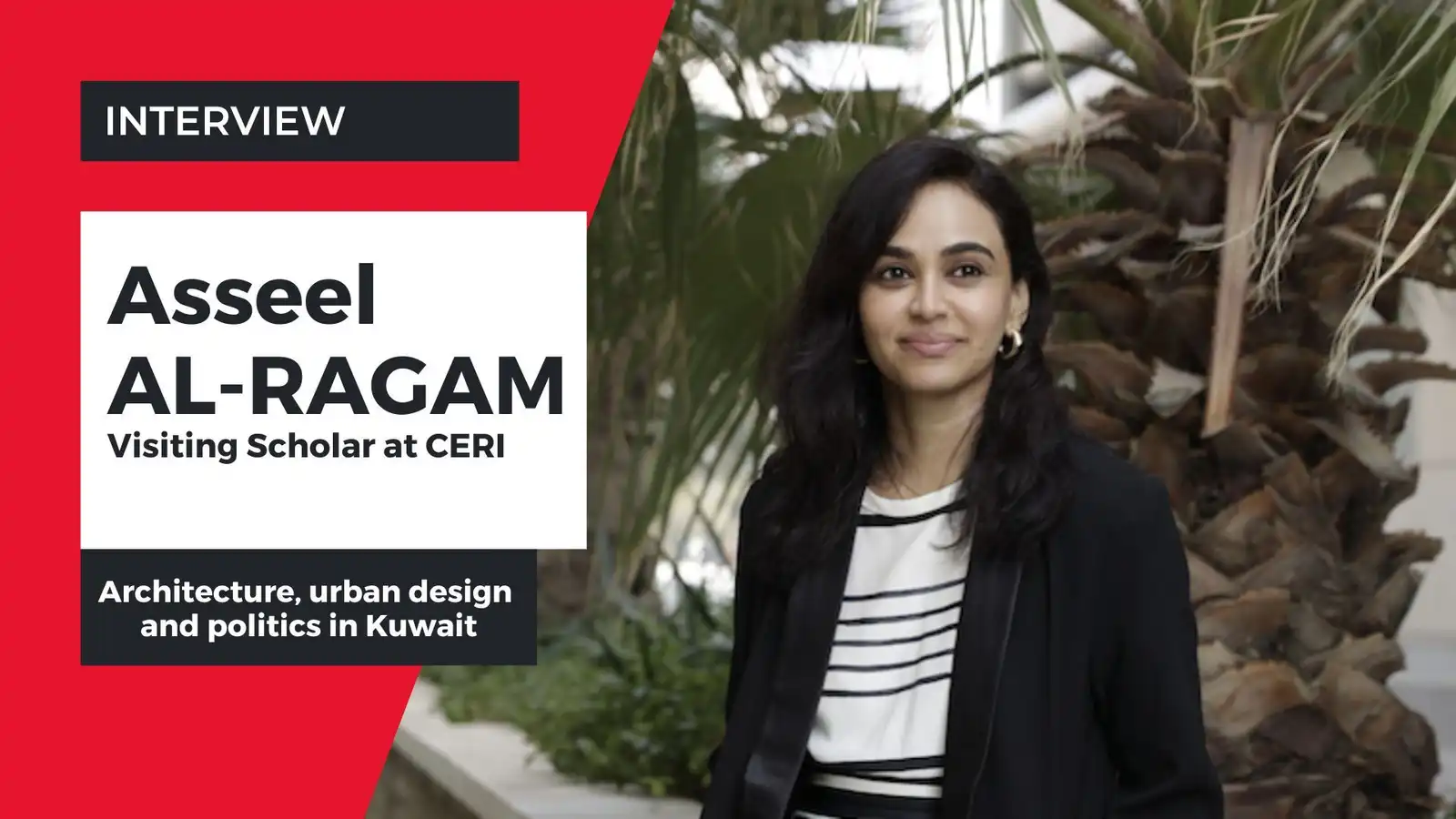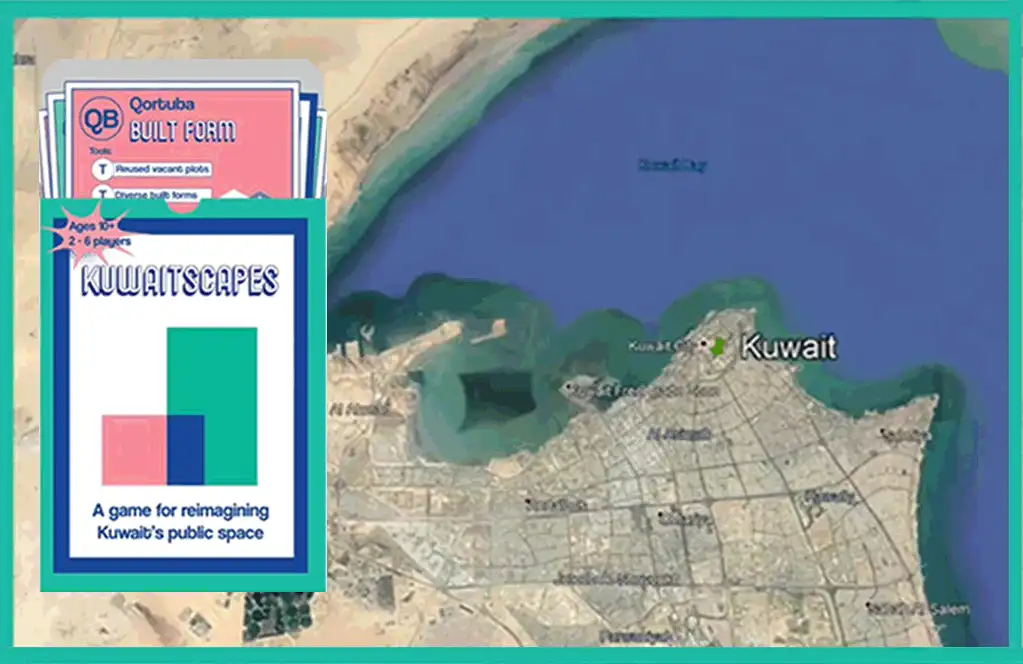Home>Combining Urban Design and Politics: Meet Asseel Al-Ragam, Visiting Scholar
16.07.2024
Combining Urban Design and Politics: Meet Asseel Al-Ragam, Visiting Scholar
Asseel Al-Ragam has been a visiting scholar at the Center for International Studies (CERI, Sciences Po) for two years. She is an Associate Professor and the Director of the Design Development and Research Lab at Kuwait University’s College of Architecture. Her research focuses on human-centred public space planning that responds to the climate crisis and material and immaterial circulation of goods, services, and knowledge to and from the Gulf. During her stay, Asseel engaged in a project titled “Operationalising Nationally Determined Contributions to Meet Sustainable Urban Development Goals: Public Participation Models for Community Engagement and Equitable Public Space”.
She answers the questions of Miriam Périer from CERI about her research and the collaborations this two-year tenure offered her, and us!
Can you present your research path and interests? How do you combine architecture, design, and politics in your research?
My research lies at the intersection of architecture, urban design, and politics, with a particular focus on Kuwait. I am deeply interested in the mutual influence between architectural and urban development and socio-political dynamics. My work often explores themes such as the use of public space, urban modernity, and the socio-cultural implications of design and planning.
A significant aspect of my research involves examining the socio-political dimensions of architecture and urban planning, such as the impact of state policies on urban development and public space. For example, I have investigated how socio-demographic factors and urban design elements affect public space use in Kuwait. This includes exploring challenges posed by high motorisation rates and the need for more walkable and sustainable urban environments. I am particularly focused on how urban design and socio-demographic factors impact behaviour and mobility patterns, emphasising the importance of creating walkable, socially inclusive environments through evidence-based policymaking. My public engagement extends to raising awareness on social media platforms.
Furthermore, my research explores the themes of ecological transitions, equity, and social justice in urban planning. I highlight the importance of participatory planning tools and methods that empower vulnerable groups, ensuring that planning decisions enhance safety, accessibility, and inclusivity. Overall, my approach combines architecture, design, and politics by developing participatory frameworks that address both the technical and socio-political aspects of urban development, promoting sustainable and equitable urban environments.
In addition to academic and policy-driven research, I have developed public participation tools aimed at engaging younger audiences. One example is the card game Kuwaitscapes, co-designed with researchers from Kuwait and London. This game raises awareness about public space use in Kuwait and serves as a tool for policymaking. It is also an enjoyable game designed to build empathy for the most vulnerable groups residing in Kuwait.
You have been a visiting scholar at CERI for two years. Can you briefly describe the project you have been working on?
During my two-year tenure at CERI, Sciences Po, I engaged in a project titled “Operationalising Nationally Determined Contributions to Meet Sustainable Urban Development Goals: Public Participation Models for Community Engagement and Equitable Public Space”. This research examined themes of ecological transitions, equity, and social justice, focusing on innovative public participation models in public space planning in Kuwait.
The study promoted integrated and participatory urban planning approaches to enhance urban land use policies in Kuwait. It explored best practices and challenges in achieving sustainable objectives, such as spatial and socio-economic integration, cultural heritage preservation, and urban sprawl prevention. The research also addressed the impacts of climate change on urban design and policy, advocating for a post-oil economy, renewable energy reliance, and healthier urban living. Using a comparative case study approach, the research aimed to encourage sustainable engagement and partnerships among diverse stakeholders, including migrant workers, the elderly, women, and children, emphasising the empowerment of vulnerable groups across different socio-demographic scales.
A significant aspect of this research involved the comparative analysis of public participation tools used in Kuwait and Paris to understand how different socio-political contexts influence urban development. In Paris, the platform “Décider pour Paris” demonstrates how digital tools can enhance civic engagement. This platform enables residents to propose ideas, vote on municipal projects, and participate in discussions about city initiatives, thus making urban planning more inclusive by reflecting the diverse needs of residents.
Similarly, in Kuwait, my research focused on developing tools that empowered vulnerable groups to engage in urban planning. The Kuwaitscapes card game, for example, was designed to involve diverse stakeholders, including women and migrant workers, in planning decisions that enhanced safety, accessibility, and inclusivity in public space. This initiative built on the findings of a previous project, "Public Space in Kuwait: From User Behaviour to Policymaking", which demonstrated the importance of evidence-based policies for creating sustainable urban environments.
By comparing these participatory approaches, the research identified best practices adaptable to different cities to address pressing climate, environmental, and social challenges. This comparative analysis helped formulate strategies that promoted equitable and sustainable urban development, drawing valuable lessons from successful models in both Kuwait and Paris.
Together with Hélène Thiollet, Eric Verdeil, and Chantal Verdeil you recently organised a conference entitled “Cities and Circulations: Challenging Theoretical Frameworks in Gulf Histories and Geographies” here at Sciences Po. What were the conference’s main objectives?
The workshop attempted to integrate historiographies of Africa, Latin America, and Asia to understand the Gulf's socio-political and economic processes through comparative insights. It explored the persistence of dichotomous frameworks like coloniser-colonised and modernity-tradition. Participants examined circulations and mobilities within the “Global South” to reframe the Gulf in broader imperial and colonial contexts, revisiting knowledge production, immigration, and cultural exchange.
The workshop was organised into two sessions, one in Kuwait in November 2023 that fleshed out these ideas, and a more recent gathering in May 2024, in Paris, that invited a larger group of scholars to address these themes through their research. The broader goal was to present a set of recommendations that would encourage the study and implementation of hybrid institutional models that integrate local and international practices, reflecting the complex socio-political landscape of the Gulf.
The recommendations promote research that:
- repositions Gulf cities within broader colonial and post-colonial histories, highlighting their connections and interactions with various empires, uncovering the continuities and critical junctures in colonial and post-colonial histories, identifying how colonial mandates have transformed over time and how these changes impact current socio-political dynamics ;
- expand the geographical and historical contexts in which Gulf studies are conducted ;
- encourage interdisciplinary research on the circulation of languages, literature, and scholarly ideas, in order to better understand cultural exchanges and their impact on historical and contemporary Gulf societies ;
- support collaborative projects and networks that facilitate knowledge exchange and comparative studies between scholars from the Gulf and other regions of the Global South.
Importantly, the goal was to make tangible the outcomes of these collaborations. The conference was an academic gathering that was not only a continuation but also an expansion of ongoing discussions that will continue to bear fruit. Having had the opportunity to be a visiting fellow at CERI-Sciences Po, and working collaboratively with French academic institutions and colleagues, has highlighted the value of such academic cooperation. This gathering was a direct result of the rich exchange between academic institutions worldwide.
What comes next for future projects?
I am currently working on a book project that revisits urban planning processes in Kuwait, examining the legacies and networks of empires that impacted Kuwait and its hinterland. Additionally, I am engaged in a research project titled "Shaping an Eco-Kuwait: A Policy Framework for Sustainable Living", a one-year study in collaboration with researchers in Kuwait and London. The research aims to analyse resource use levels, sustainable policy adoption, and user awareness and behaviour.
The goal is to assess existing policies and behaviours, creating evidence to bridge the gap between the sectors of housing, energy, and transport. By doing so, the research seeks to contribute to policy amendments and develop mediation tools to enhance user awareness and behaviour change. This facilitates the efficient implementation and adoption of environmental policies across these three sectors, promoting a more integrated and sustainable approach to resource management in Kuwait.
I also hope this is only the beginning of a rich exchange with my French colleagues, allowing us to develop new research and academic exchange modalities. I am incredibly grateful for this opportunity that facilitated new engagements and knowledge circulations.

